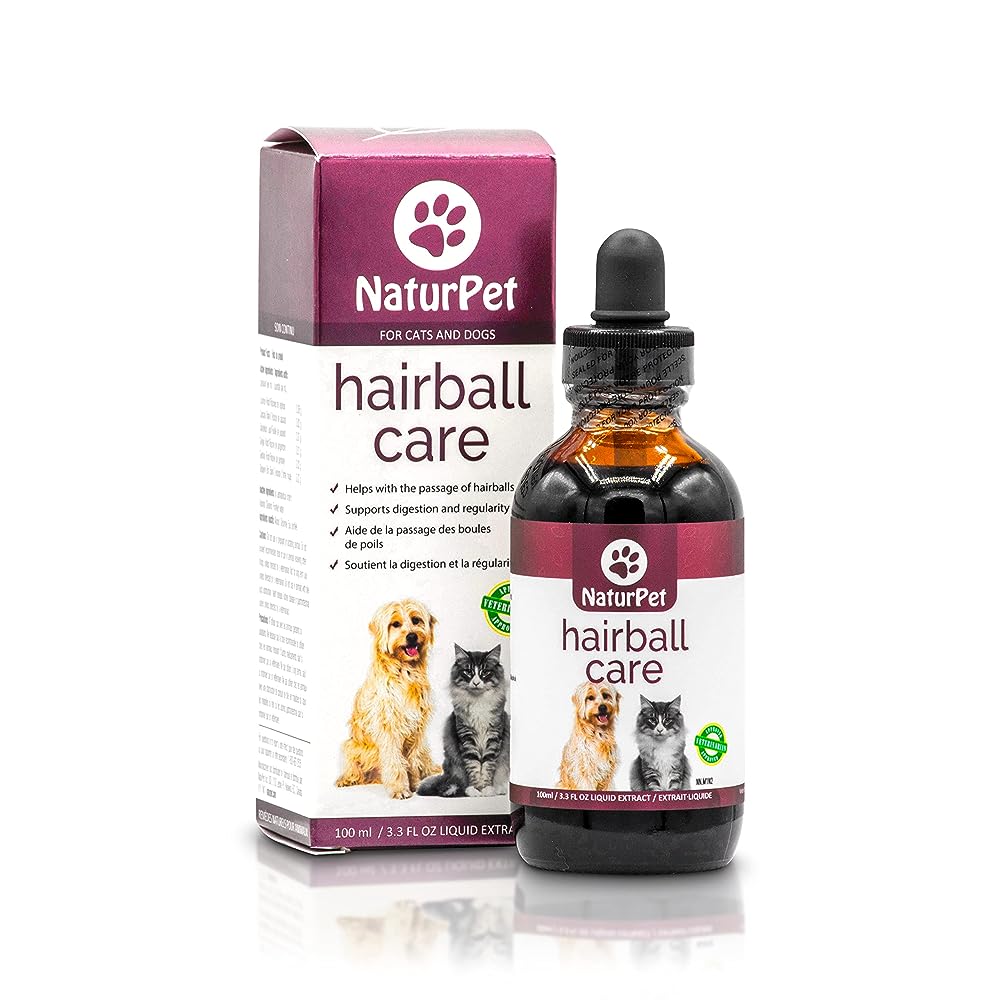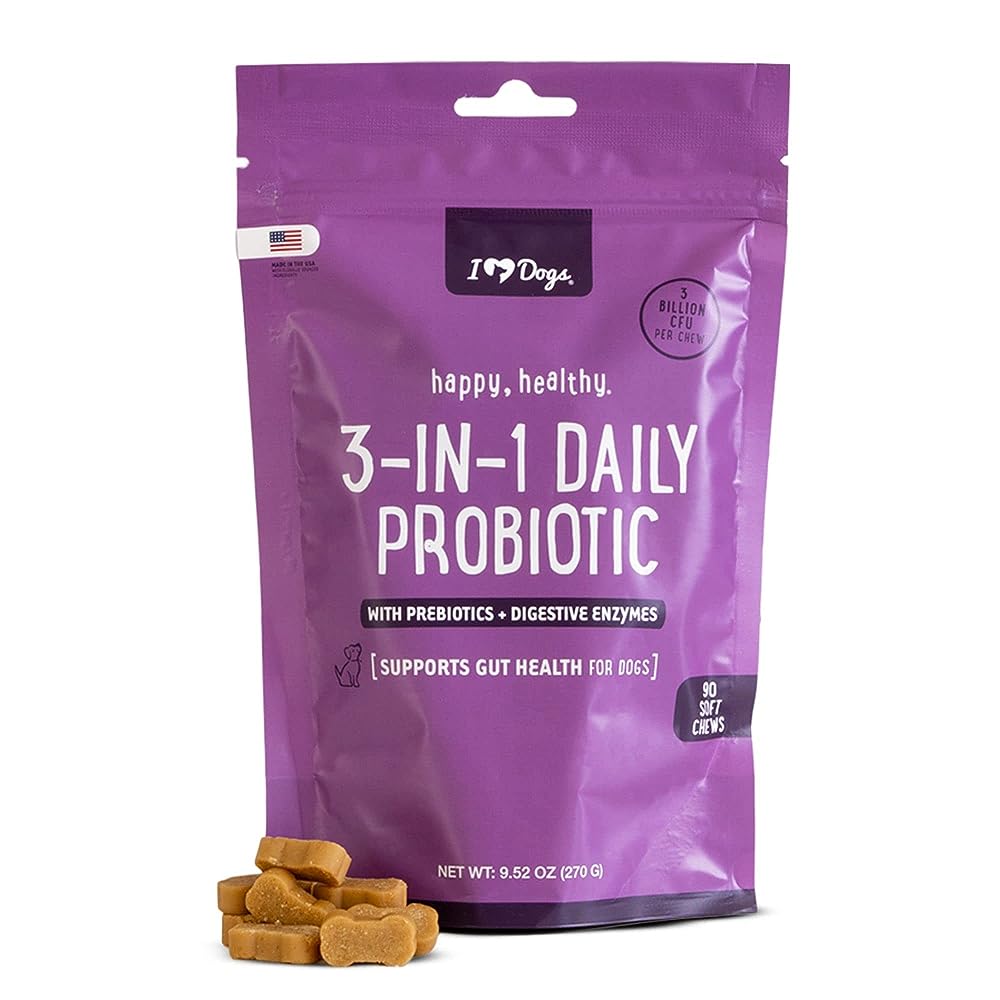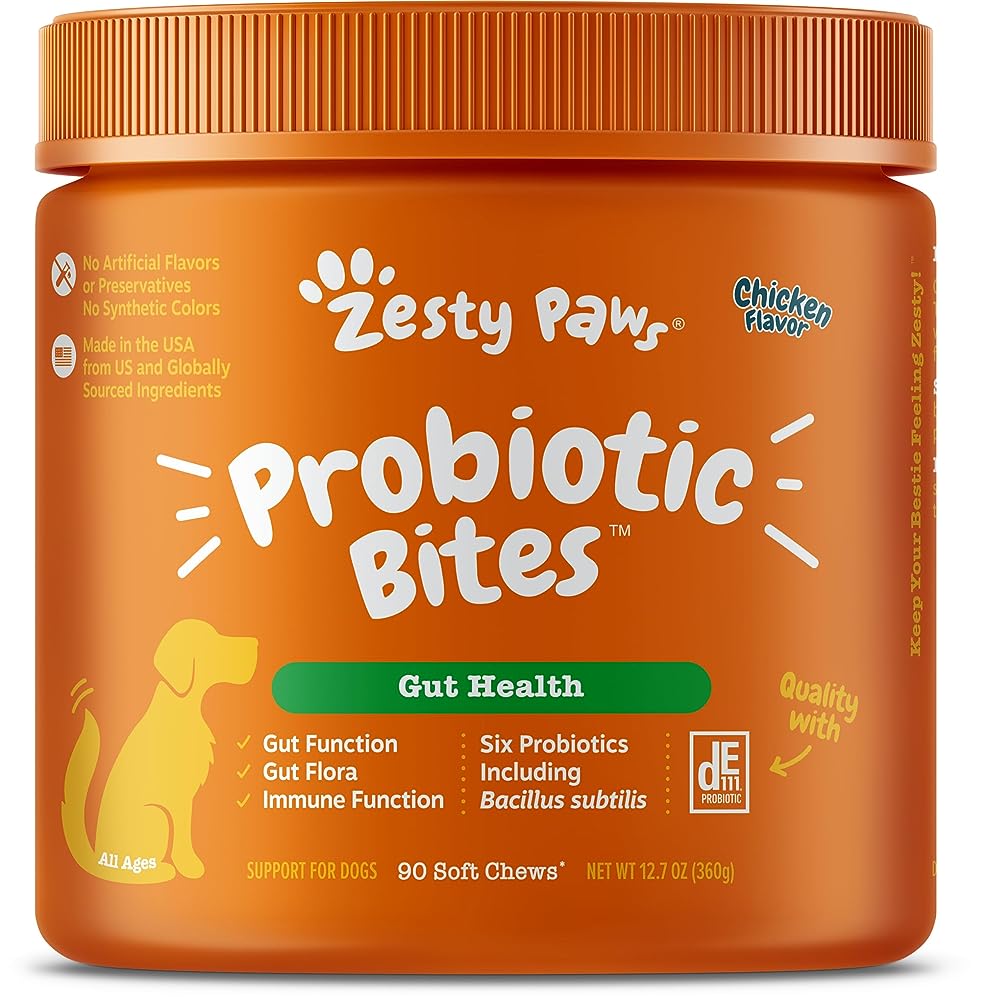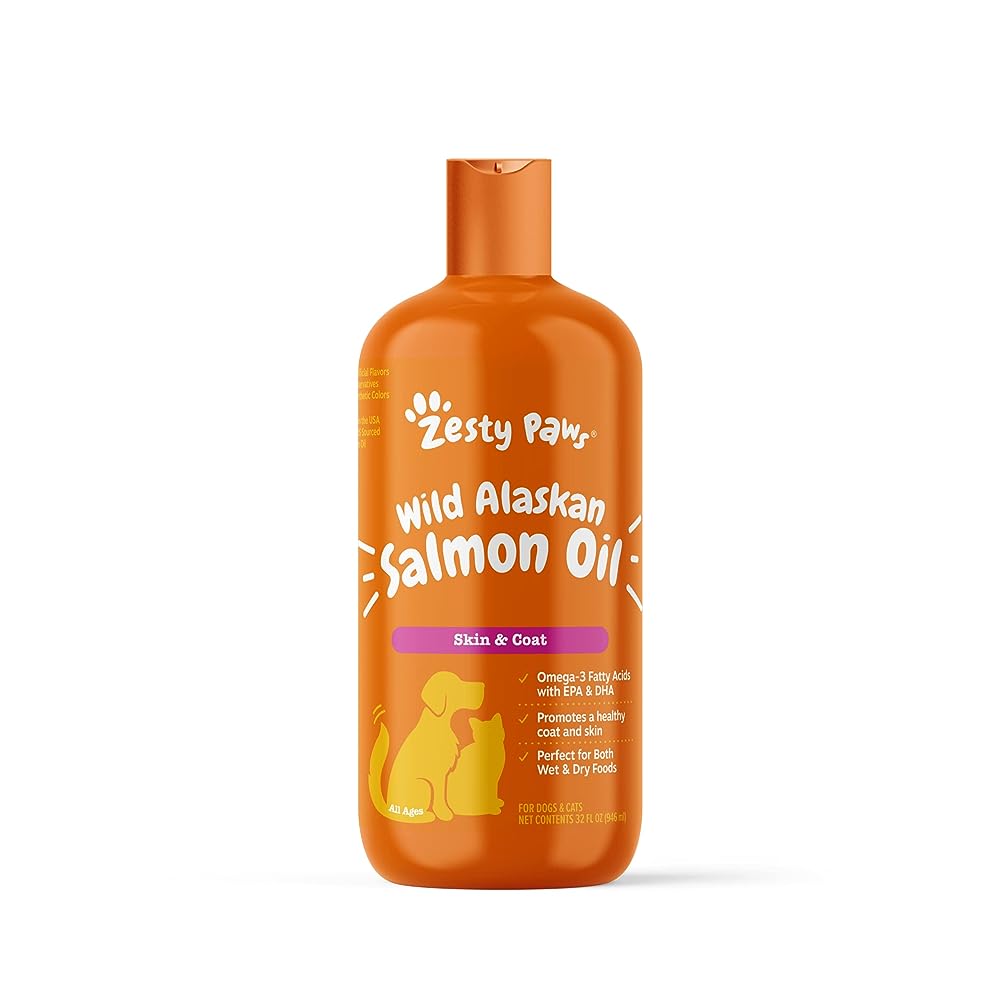iHeartDogs is reader supported. Some of the links below may be paid affiliate links, where we receive a small commission on a product at no additional cost to you.
Hairballs aren’t just a feline issue; they can also be a problem for our canine companions, particularly those with long or thick hair that tend to groom themselves frequently. The accumulation of hair in the digestive tract can lead to discomfort and health issues. Fortunately, there are several effective hairball remedies designed specifically for dogs. This article will guide you through the best hairball remedies for dogs, providing insights into their ingredients, effectiveness, and how they can aid your pet’s health.
#1 – NaturPet Hairball Care | Natural Herbal Drops to Support Digestion, Hairballs, Gas, Bloating | Cats& Dogs | 100mL
The NaturPet Hairball Care is a natural herbal supplement designed to support digestion and alleviate hairballs, gas, and bloating in cats and dogs. It works by loosening hairballs and aiding their passage through the digestive system. Additionally, the product acts as a cleansing agent for the kidneys, liver, and gallbladder, improving overall digestion. The supplement contains mucilage, which coats the lining of the digestive tract, making it easier for hairballs to pass through. It also helps soothe indigestion and break down gas that may cause bloating and discomfort.


#2 – iHeartDogs 3-in-1 Probiotic for Dogs with Pumpkin for Improved Digestion & Gut Health – Dog Probiotics and Digestive Enzymes, 90 Count
The iHeartDogs 3-in-1 Probiotic for Dogs with Pumpkin is a dietary supplement that promotes healthy digestion and gut health in dogs. It combines probiotics, prebiotics, and digestive enzymes into a delicious chew, providing three levels of protection for digestive health. Additionally, the chew is rich in vitamins and minerals that boost the immune system and is allergy-friendly, making it suitable for dogs with food sensitivities and allergies.

#3 – iHeartDogs Salmon Oil for Dogs and Cats – Nourishing Skin & Coat Omega 3 Fish Oil for Dogs Supports Allergy & Itch Relief, Heart Health and Joint Health – 32 oz
The iHeartDogs Salmon Oil is a single-ingredient, 100% Norwegian salmon oil that is rich in omega-3, omega-6, and omega-9 fatty acids. It supports a healthy immune system, heart health, joint health, and promotes healthy skin and coat for dogs and cats. This oil provides dynamic health support including allergy and itchy skin relief, aids in pain and mobility support, and revitalizes dull coats. It is sustainably produced, fully traceable, and does not contain GMOs, antibiotics, preservatives, or additives. Additionally, with every purchase, 12 meals are provided for shelter dogs.

#4 – Zesty Paws Probiotics for Dogs – Digestive Enzymes for Gut Flora, Digestive Health, Diarrhea & Bowel Support – Clinically Studied DE111 – Dog Supplement Soft Chew for Pet Immune System – Chicken
Zesty Paws Probiotics for Dogs is a soft chew supplement that contains digestive enzymes and probiotics to support the overall digestive health of canine pets. The product features a clinically studied probiotic called DE111, which helps improve digestive function and boost the immune system. With a blend of six probiotics, these chewable also aid in maintaining healthy gut flora and provide support against occasional digestive issues like diarrhea, gas, and bloating. Additionally, the supplement promotes immunity and is suitable for dogs of all sizes.


#5 – Pure Wild Alaskan Salmon Oil for Dogs & Cats – Omega 3 Skin & Coat Support – Liquid Food Supplement for Pets – Natural EPA + DHA Fatty Acids for Joint Function, Immune & Heart Health, 32 Fl Oz
Pure Wild Alaskan Salmon Oil is a liquid food supplement for dogs and cats that contains essential fatty acids to support a healthy coat. It is a rich source of Omega-3 fatty acids, including EPA and DHA, which promote joint function, immune system health, and heart health in pets. In addition to providing nourishment for the skin and coat, the oil can be used as a food topper, making it a convenient option for pet owners.


What Are Some Supplements That Can Help Prevent Hairballs in Dogs?
Several supplements can help prevent hairballs in dogs, primarily by supporting the health of the digestive system and promoting a healthy coat:
- Fiber Supplements: Fiber can help to move hair through the digestive system, preventing it from clumping together and forming hairballs. Pumpkin is a natural source of fiber that many dogs enjoy.
- Omega-3 Fatty Acids: Found in fish oil supplements, Omega-3 fatty acids can improve skin health and reduce shedding, which can help prevent the formation of hairballs.
- Probiotics: These beneficial bacteria support a healthy gut environment, which can help the digestive system deal with any hair that is swallowed.
- Enzyme Supplements: Digestive enzymes can help break down hair in the stomach before it has a chance to clump together.
- Lecithin: This supplement can help prevent the formation of hairballs by emulsifying and breaking down fats that cause hair to stick together in the stomach.
Always consult with your vet before starting any new supplement regimen for your dog, as they can provide guidance on appropriate dosages and potential interactions with other medications your dog may be taking.
Frequently Asked Questions About Dog Hairball Remedies
- Q: Can dogs get hairballs just like cats? A: While it’s much less common than in cats, dogs can indeed get hairballs. This typically happens when dogs groom themselves and swallow hair, which can accumulate in the stomach. Some dogs may be more prone to this, such as those who shed a lot or have longer hair.
- Q: How can I tell if my dog has a hairball? A: Dogs with hairballs may cough, vomit, have decreased appetite, or show signs of a blocked digestive tract, such as constipation or diarrhea. If you see your dog exhibiting these symptoms, it’s important to consult with a veterinarian.
- Q: What can I do to prevent hairballs in my dog? A: Regular grooming can help reduce the amount of hair your dog swallows. Certain dietary supplements, such as those containing fiber or omega-3 fatty acids, can also help by promoting a healthy coat and aiding digestion.
- Q: Are there specific breeds that are more susceptible to hairballs? A: Breeds with longer hair or those that shed heavily may be more likely to develop hairballs. However, any dog that ingests a significant amount of hair could potentially develop a hairball.
- Q: Can hairballs cause serious health problems in dogs? A: Yes, in rare cases, hairballs can cause serious health issues if they block the digestive tract. If your dog is frequently vomiting or showing signs of distress, it’s important to seek veterinary care.
- Q: How are hairballs treated in dogs? A: In mild cases, dietary changes or hairball remedies may help. In severe cases, surgical removal may be necessary. Always consult with a veterinarian for appropriate treatment options.
- Q: Can hairball remedies for cats be used for dogs? A: While some hairball remedies are designed for both cats and dogs, always check the label and consult with your vet before giving your dog a product designed for cats.
- Q: How often should I groom my dog to prevent hairballs? A: This can depend on your dog’s breed and coat type, but as a general rule, brushing your dog a few times a week can help reduce the amount of loose hair that they might swallow.
- Q: Are there any natural remedies for hairballs in dogs? A: Natural dietary fibers, such as pumpkin or psyllium husk, can help move hair through the digestive system. Regular grooming and ensuring your dog has plenty of water can also help.
- Q: What should I do if I think my dog has a hairball but isn’t showing serious symptoms? A: If your dog seems to be in discomfort but isn’t showing severe symptoms, it’s still a good idea to contact your vet. They may suggest dietary changes or a hairball remedy to help your dog pass the hairball safely.
Conclusion: Best Hairball Remedies for Dogs
In conclusion, while hairballs are less common in dogs than in cats, they can still pose a significant health issue. A good hairball remedy can help ensure your dog’s comfort and well-being. However, if your dog is frequently coughing up hairballs, it’s advisable to consult your vet as this might be an indication of an underlying health problem. Remember, each dog is unique, and what works best for one might not be as effective for another. Therefore, it’s always best to consider your dog’s specific needs when choosing the best hairball remedy for them.
iHeartDogs is reader supported. Some of the links below may be paid affiliate links, where we receive a small commission on a product at no additional cost to you.
- Best Joint Supplement for Dogs
- Best CBD Gummies for Dogs
- Goat's Milk for Dogs
- Skin & Coat Supplements for Dogs
- Weight Gain Supplements for Dogs
- Muscle Building Supplements for Dogs
- Heart Supplements for Dogs
- Multivitamins for Dogs
- Pill Pockets for Dogs
- Digestive Enzymes for Dogs
- Turmeric for Dogs
- Liver Supplements for Dogs
- Tear Stain Supplement for Dogs
- Breath Fresheners for Dogs
- Kidney, Urinary, & Bladder Supplements for Dogs
- Stool Eating Deterrent for Dogs
- Eye Supplements for Dogs
- Melatonin for Dogs
- Apple Cider Vinegar for Dogs
- Green Lipped Mussels for Dogs
- L Theanine for Dogs
- Chondroitin Supplements for Dogs
- MSM for Dogs
- Valerian Root for Dogs
- Chamomile for Dogs
- Boswellia for Dogs
- L Tryptophan for Dogs
- Yucca for Dogs
- Licorice Root for Dogs
- Bromelain for Dogs
- Papain for Dogs
- Devil's Claw for Dogs
- Quercetin for Dogs
- Hemp gummy for dogs
- Best Hemp Dog Treats
- Best Hemp Oil for Dogs
- Best Calming Treats, Chews, & Supplements for Dogs
- Best Bone Broth for Dogs
- Best Fish Oil for Dogs
- Best Probiotics for Dogs
- Best Hip Dysplasia Supplements for Dogs
- Best Colostrum for Dogs
- Best Quercetin for Dogs
- Best Greens for Dogs Supplements
- Best Vitamin C Supplements for Dogs
- Best Probiotic for Dog with Allergies
- Best Taurine Supplements for Dogs
- Best Dog Food Toppers
- Best Anal Gland Supplement for Dogs
- Best Dog Probiotic Powder
- Best CoQ10 Supplement for Dogs
- Best Liquid Glucosamine for Dogs
- Best Wrinkle Creams, Balms, and Wipes for Dogs
- Best Puppy Calming Treats
- Best Colloidal Silver for Dogs
- Best Adaptogen Supplements for Dogs
- Best Cognitive Supplements for Dogs
- Best Bee Pollen for Dogs
- Best Vitamin A Supplements for Dogs
- Best Vitamin E Supplements for
- Best Liquid Glucosamine Supplements for Dogs
- Best SAM-e Supplements for Dogs
- Best Hyaluronic Acid Supplements for Dogs
- Best Apple Cider Vinegar Supplements for Dogs
- Best Diarrhea Medicine for Dogs
- Best Milk Thistle for Dogs
- Best Turkey Tail Mushroom Supplements for Dogs
- Best Astaxanthin Supplements for Dogs
- Best Lutein Supplements for Dogs
- Best Electrolyte Supplements for Dogs
- Best Coconut Oil for Dogs
- Best Prenatal Vitamins for Dogs
- Best Puppy Milk Replacements
- Best Iron Supplements for Dogs
- Best Dewormer Products for Dogs
- Best Mange Medications for Dogs
- Best Cough Relief Products for Dogs
- Best Sinus Relief Products for Dogs
- Best Collapsed Trachea Supplements for Dogs
- Best Fireworks Anxiety Relief Products for Dogs
- Best Thunderstorm Anxiety Relief Products for Dogs
- Best Travel Anxiety Relief Product for Dogs
- Best Supplements for a Dog with a Torn ACL
- Best Supplements for a Dog with Patellar Luxation
- Best Supplements for a Dog with Intervertebral Disc Disease
- Best Zinc Supplements for Dogs
- Best Biotin Supplements for Dogs
- Best Tart Cherry Supplements for Dogs
- Best Resveratrol Supplements for Dogs
- Best Ginkgo Biloba Supplements for Dogs
- Best Ashwagandha Supplements for Dogs
- Best Supplements for Dogs with Cushing's Disease
- Best Adrenal Supplements for Dogs
- Best NAD+ Supplements for Dogs
- Best NMN Supplements for Dogs
- Best Supplements for Dogs with Dementia
- Best Supplements for Dogs with CCD(Canine Cognitive Dysfunction)
- Best Fiber Supplements for Dogs
- Best Spirulina for Dogs
- Best Hairball Remedies for Dogs
- Best Eye Drops for Dogs with Allergies
- Best Magnesium Supplements for Dogs
- Best Brushes for Double-Coated Dogs
- Best Dandelion Root Supplements for Dogs
- Best Probiotic for Dogs with Yeast Infections
- Best Flaxseed Oil for Dogs
- Best Chamomile Supplements for Dogs
- Best Lavender Supplements. Treats & Sprays for Dogs
- Best Collagen Supplements for Dogs
- Best Kelp Supplements for Dogs
- Best Activated Charcoal for Dogs
- Best Slippery Elm Supplements for Dogs
- Best Supplements for Dogs with Seizures & Epilepsy
- Best Antioxidant Supplements for Dogs
- Best Ubiquinol Supplements for Dogs
- Best Hormone & Glandular Supplements for Dogs
- Best Thyroid Supplements for Dogs
- Best Iodine Supplements for Dogs
- Best Dog Shedding Supplements for Dogs
- Best Detox Supplements for Dogs
- Best Postbiotics for Dogs
- Best Aspirin Products for Dogs
- Best Dog Anti-Nausea Products
- Best Dog Mouthwashes
- Best Camelina Oils for Dogs
- Best Hemp Seed Oils for Dogs
- Best Natural Anti-Inflammatories for Dogs
- Best Cancer Supplements for Dogs
- Best Sardine & Anchovy Oils for Dogs
- Best Fatty Acid Supplements for Dogs
- Best Chia Seed Supplements & Treats for Dogs
- Best Olive Oils for Dogs
- Best Amino Acid Supplements for Dogs
- Best Moringa Supplements for Dogs
- Best Echinacea Supplements for Dogs
- Best Cranberry Supplements for Dogs
- Best D-Mannose Supplements for Dogs
- Best Nettle Leaf Supplements for Dogs
- Best Marshmallow Root Supplements for Dogs
- Best Astragalus Supplements for Dogs
- Best Pumpkin Seed Supplement for Dogs
- Best Supplements for a Dog Wetting The Bed
- Best Blueberry Supplement for Dogs
- Best Bromelain Supplements for Dogs
- Best Yucca Supplements for Dogs
- Best Ginger Supplements for Dogs
- Best Rosehip Supplements for Dogs
- Best Allergy Medicines for Dogs
- Best Reishi Mushroom Supplement for Dogs
- Best Maitake Mushroom Supplement for Dogs
- Best Chaga Mushroom Supplement for Dogs
- Best Shiitake Mushroom Supplement for Dogs
- Best Cordyceps Mushroom Supplement for Dogs
- Best Lion's Maine Supplement for Dogs
- Have question? - Ask in our Dog Health Forum
 Toledo, United States.
Toledo, United States.
